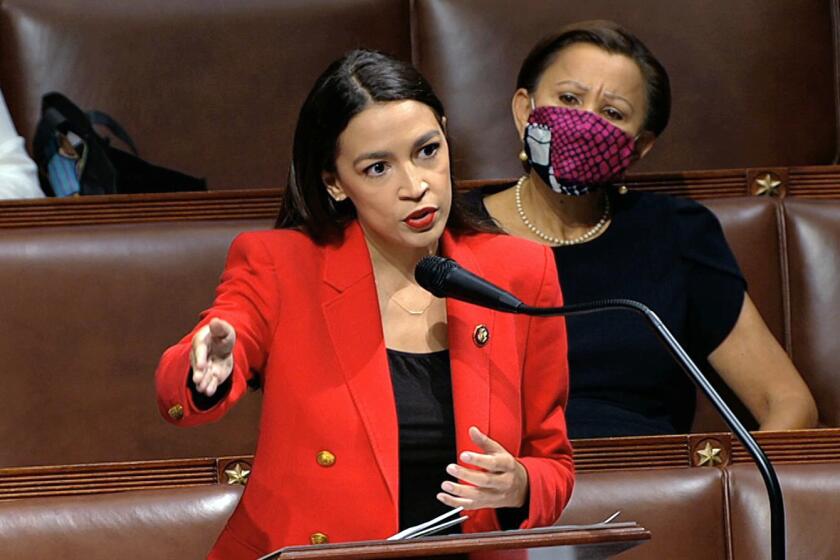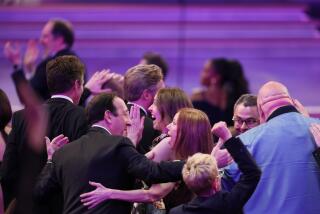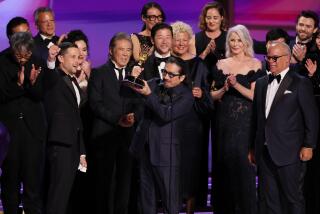Column: 2020 Emmy nominees are a wall of female rage, none angrier than ‘The Morning Show’
“Game of Thrones” may be absent from the Emmy nominations list, but its themes of female power and rage linger on.
Certainly the drama series nominations form, with a few exceptions, a veritable wall of female rage, albeit some more obviously — “The Handmaid’s Tale” and “Killing Eve” — than others — “The Crown” (the repressed rage of queen and princess) and “Stranger Things” (Eleven’s powers are certainly a metaphor for something); even the multiply nominated seasons of “Ozark” and “Succession” leaned heavily on the struggles of their female characters.
The limited-series category, meanwhile, is exclusively — and for the first time — filled with female-led shows, all of which chronicle various battlefields of oppression: the personal (“Little Fires Everywhere”), the religious (“Unorthodox,”), the criminal (“Unbelievable,” “Watchmen”) and the political (“Mrs. America”).
All of them are amazing — in the age of “too much TV” there are no “seat fillers” on Emmy nomination lists — and several, including “Watchmen” and “Mrs. America,” speak with eerie prescience to the police brutality and racist culture fueling the current Black Lives Matter protests.
But none is better at capturing the messy, repressed and non-repressed, flailing, faltering, courageous, complicit, white-hot and absolutely non-metaphorical rage felt by women during these years of #MeToo than “The Morning Show,” which received eight nominations.
These did not include best drama and, ironically enough, all but one of the acting nominations went to men — Steve Carell for lead actor; Mark Duplass, Billy Crudup for supporting — with lead actress Jennifer Aniston the sole female representative on a list that should have included costars Reese Witherspoon and Gugu Mbatha-Raw.
Analysis of the 2020 Emmy nominations reveals large gains over previous years for Black artists, while Latino, Asian representation were disappointingly flat.
That said, eight nominations for “The Morning Show” is kind of a miracle.
After all, a century or so ago in 2019, when things like the debut of multiple new streaming services could still be reasonably seen as upending the world as we know it (backward, turn backward, oh time, in your flight), “The Morning Show” received mixed to negative reviews.
Which, as my colleague Robert Lloyd pointed out at the time, was a bit baffling.
Yes, “The Morning Show” was the very expensive crown jewel of the Apple TV + debut, burdened by the platform’s irritatingly self-important secrecy and the long-entrenched love/hate relationship many have with the Apple brand. Yes, the cast had a Titanic-like hubris about it (“Friends,” meet “The Office”!) and a show about television shows dares those who write about television to reach for their sharpest blades (see also “The Newsroom”).
Especially if it deals, as “The Morning Show” does, in ripped-from-the-news plot points.
There is no denying that the series has a less-than-smooth narrative arc and some off-key character developments, all of which reveal the stranger-than-fiction backstory of its creation. Originally based on Brian Stelter’s “Top of the Morning: Inside the Cutthroat World of Morning TV” and created by political consultant-turned-screenwriter Jay Carson, “The Morning Show” became something else entirely after Matt Lauer was fired from “Today” amid allegations of sexual harassment.
A Republican congressman insulted Rep. Alexandria Ocasio-Cortez with a slur most women have heard all too often. Her response was a welcome challenge.
When Kerry Ehrin was brought in to replace Carson as showrunner, the writing was already underway. She fought to make #MeToo the primary focus and indeed, the show begins with the firing of Carell’s Mitch Kessler and revolves around the subsequent fallout for him, the show, its staff and particularly Mitch’s cohost, Alex Levy (Aniston).
While coping with a decline in ratings and her own history of compromise while fighting for success, Alex impulsively recruits Bradley Jackson (Witherspoon) as her new cohost. An outspoken rogue reporter, Bradley has no history to protect, and between her fresh gaze and revelations made by head booker Hannah Shoenfeld (Mbatha-Raw), Alex comes to see how, wittingly or not, she has been complicit in a system that allowed Mitch’s predatory behavior to continue unchecked.
The Frankenstein-seams show at times — and that is what makes this very good show great.
The moments in which the show stutters — when not just the characters but the story developments seem at a loss over what to do as a coworker/friend/lover/idol is revealed to be a predator — perfectly capture the feeling so many people have had as the pervasiveness of sexual harassment and assault in virtually every industry continues to be revealed.
“Mrs. America” shows how Phyllis Schlafly stopped the ERA. For a lifelong feminist, it’s a tough watch. It’s also one of TV’s most important.
Like a fire hydrant springing first a leak and then a roar of water jetting in every direction, the anger in “The Morning Show” takes every form and leaves no one untouched. Alex, Bradley, Hannah and the other women of the show are furious with Mitch, with the media and with themselves. As Alex slowly realizes that all the sacrifices she made to succeed were simply her capitulation to a system that was specifically designed to keep her and other women from positions of power, the rage threatens to be overwhelming.
If the path to success is a misdirect, a con, and the alternative to complicity is the constant, exhausting, soul-draining identification of every inequality, every disparaging remark, every predatory action, what are women who just want to succeed in their field supposed to do?
It is a testament to the writing, and Aniston’s ability, that Alex, quite believably, neither retreats in despair nor, in the end, burns down her own house. She and the show within the show find a new normal, one that offers hope but not denial.
Which “The Morning Show” itself also does. It isn’t perfect, it doesn’t offer up a pitch-perfect climax or a neat ending, nor does it trail off into the safe and increasingly crowded realm of stories that end with a calculated non-answer. More than occasionally it seems to be working at cross-purposes. But like its characters, the show struggles to see the problems clearly and tries to create a reasonable solution.
Just like the rest of us are doing. In its second season, “The Morning Show” will deal with the pandemic; I only hope it will be just as messy, stunned, explosive and full of swings between doubt and certainty as its first.
More to Read
The biggest entertainment stories
Get our big stories about Hollywood, film, television, music, arts, culture and more right in your inbox as soon as they publish.
You may occasionally receive promotional content from the Los Angeles Times.












